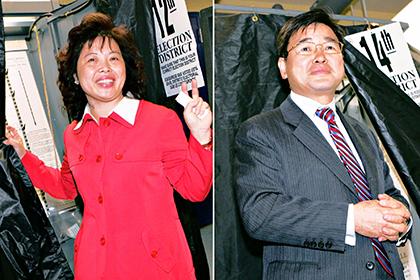By Connor Adams Sheets
Second in a Series
Paying dues is the key to making it onto the northeast Queens political map, Democrat and Republican political operatives say, unless a potential candidate has serious money and connections.
Helping the community, working on campaigns and earning the trust and respect of voters are the steps which put lone political neophytes in the public eye and give them a shot at winning elected office.
The first step candidates who are not independently wealthy and do not come from a legacy should take is to establish themselves in the community where they will be running, according to aides, and current and former candidates for state and city office.
A lack of roots in a community can bring down even well-funded, connected candidates, as was the case in last year’s Flushing City Council election.
Yen Chou, a little-known Democrat, lost in a district with more than five Democrats for every Republican to Republican Peter Koo, a local businessman many called the “Mayor of Flushing” because of his philanthropy and the rags-to-riches story behind his chain of Starside Drugs stores.
Next for an aspiring elected is to start paying those dues in order to catch the attention of the people who can boost a candidate to the next level, namely the leaders and members of political clubs and district leaders.
That work, such as running an American Legion post or Boy Scout troop, helping with campaigns and doing good turns can have its rewards when running for office, as District Leader Martha Flores-Vasquez has shown. The Murray Hill resident has won three of the four Democratic district leader races in her area of Flushing, called Part A, since 2002.
As she and people familiar with her put it, that achievement can be chalked up to the fact that she has lived there for 34 years and been involved in the community service scene the entire time, not any connections to power-brokers.
She is the founding executive director of Community Prevention Alternatives, a nonprofit that offers free counseling for domestic violence victims and others who need it.
The Queens County Democratic organization, often referred to simply as County, is not backing her candidacy this year and therefore will not help her boost what she admits is her weaker ability to raise campaign funds in comparison to other better connected candidates.
“People are power-hungry, but it’s not about power. It’s about who has the experience and the background and a strong history of service and that’s me,” she said. “My work qualifies me for the position. I’m like a household name to everyone. Everybody knows Martha. At the end of the day it should not be about politics. It’s about who’s the best fit to serve the community.”
Once his or her background has been established, a potential candidate generally heads to the local political clubs, which serve the role of evaluating possible candidates and introducing them to the community. When a club finds a candidate or a few candidates it likes, the top members will send them up the ladder to the district leaders, who have the ability to give a candidate greater credibility with their county party organization.
“The club is the true grassroots of any election. We’re the starting point. You want to get involved in the local political club, meet the people there and learn,” said Janet Malone, president of the Northeast Queens Republican Club, formerly known as the Bayside Republican Club and office manager for state Sen. Frank Padavan (R-Bellerose). “People come in and say, ‘Ooh, can I run for that office?’ They might not have any knowledge of politics, many don’t even have knowledge of the neighborhood. We’re looking for what they’re going to do for us and how. Are you involved in local political groups, civic groups, the church, do you work Election Day? Do you know who you vote for and why?”
Candidates are then invited to appear before the clubs to present their platforms, introduce themselves to the community and discuss their qualifications. At their May meetings the Northeast Queens Republican Club hosted several GOP candidates for the District 26 state Assembly race and the Democratic Club of Flushing held a vetting session for Nicholas Bais, a candidate for Queens Civil Court judge, choosing at the end to endorse him.
Winning a club’s backing can help get a candidate the blessings of the county organization, but Julia Harrison, a Flushing district leader, former councilwoman and former assemblywoman who helps run the Democratic Club of Flushing, said that can be a dubious honor.
She said she was made a viable candidate not through the endorsement of the county’s Democratic organization, but because she had served the community for 30 years before running for office. Padavan said people looking to get into politics should spend many years gaining real-world experience by mastering another profession or helping others before moving into politics. He served his country for 30 years in the U.S. Army Corps of Engineers, reaching the rank of colonel, before running for office.
“Our club supports candidates who are deemed to be worthwhile, but the only thing it will do for you is get you the good graces of the Queens County organization,” Harrison said. “Then you are officially supposed to go to the county organization next … but you only go to them if you want their backing.”
In the end, good deeds, experience and even incumbency are often not enough to get the support of the county organization, as is the case in this year’s district leaders campaigns in the 22nd state Assembly District in Flushing.
Incumbents Harrison and Flores-Vasquez and their two male counterparts have been denied that backing by the Democratic county organization, which could cripple their candidacies. The county instead went with a slate prepared by former Flushing Councilman John Liu, who has used his tremendous power as the city’s new comptroller in recent months to manipulate Flushing politics, according to a half-dozen sources familiar with the negotiations.
Three of the people on his district leader slate have worked for him. EunChul “Agnes” Kim, who was an aide when he was councilman, now works for him in the comptroller’s office; Phil Um was Liu’s chief of staff in his early days on the Council; and former Flushing BID head Mabel Law, rumored to be planning to work for Liu, has been one of his leading fund-raisers for years. Rounding out the slate is S.J. Jung, who is not known to have worked for him.
The Queens County Democratic Party is afraid to buck the powers that be, the sources say. It is not a loyal friend, it is an efficient machine that wins elections.
Reach reporter Connor Adams Sheets by e-mail at csheets@cnglocal.com or by phone at 718-260-4538.

































